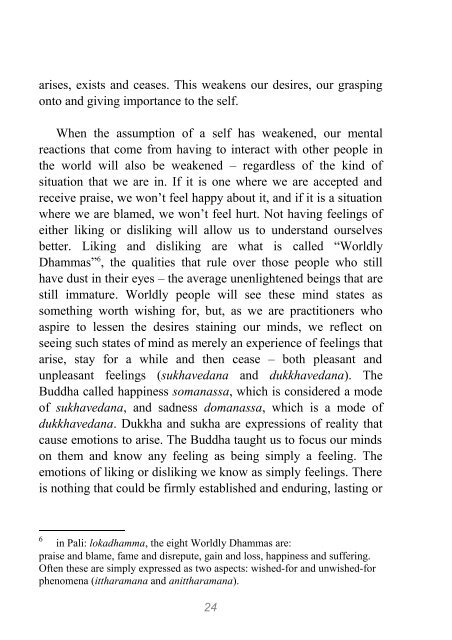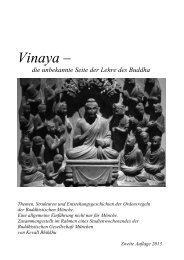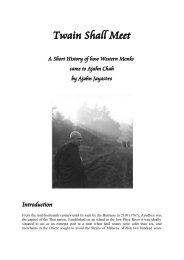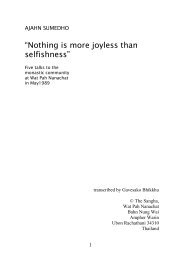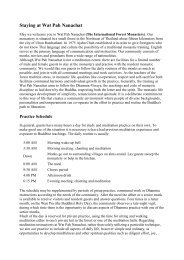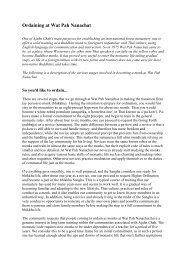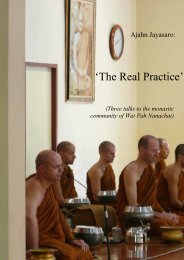Luang Por Liem: The Ways of the Peaceful - Wat Pah Nanachat
Luang Por Liem: The Ways of the Peaceful - Wat Pah Nanachat
Luang Por Liem: The Ways of the Peaceful - Wat Pah Nanachat
You also want an ePaper? Increase the reach of your titles
YUMPU automatically turns print PDFs into web optimized ePapers that Google loves.
arises, exists and ceases. This weakens our desires, our grasping<br />
onto and giving importance to <strong>the</strong> self.<br />
When <strong>the</strong> assumption <strong>of</strong> a self has weakened, our mental<br />
reactions that come from having to interact with o<strong>the</strong>r people in<br />
<strong>the</strong> world will also be weakened – regardless <strong>of</strong> <strong>the</strong> kind <strong>of</strong><br />
situation that we are in. If it is one where we are accepted and<br />
receive praise, we won’t feel happy about it, and if it is a situation<br />
where we are blamed, we won’t feel hurt. Not having feelings <strong>of</strong><br />
ei<strong>the</strong>r liking or disliking will allow us to understand ourselves<br />
better. Liking and disliking are what is called “Worldly<br />
Dhammas” 6 , <strong>the</strong> qualities that rule over those people who still<br />
have dust in <strong>the</strong>ir eyes – <strong>the</strong> average unenlightened beings that are<br />
still immature. Worldly people will see <strong>the</strong>se mind states as<br />
something worth wishing for, but, as we are practitioners who<br />
aspire to lessen <strong>the</strong> desires staining our minds, we reflect on<br />
seeing such states <strong>of</strong> mind as merely an experience <strong>of</strong> feelings that<br />
arise, stay for a while and <strong>the</strong>n cease – both pleasant and<br />
unpleasant feelings (sukhavedana and dukkhavedana). <strong>The</strong><br />
Buddha called happiness somanassa, which is considered a mode<br />
<strong>of</strong> sukhavedana, and sadness domanassa, which is a mode <strong>of</strong><br />
dukkhavedana. Dukkha and sukha are expressions <strong>of</strong> reality that<br />
cause emotions to arise. <strong>The</strong> Buddha taught us to focus our minds<br />
on <strong>the</strong>m and know any feeling as being simply a feeling. <strong>The</strong><br />
emotions <strong>of</strong> liking or disliking we know as simply feelings. <strong>The</strong>re<br />
is nothing that could be firmly established and enduring, lasting or<br />
6 in Pali: lokadhamma, <strong>the</strong> eight Worldly Dhammas are:<br />
praise and blame, fame and disrepute, gain and loss, happiness and suffering.<br />
Often <strong>the</strong>se are simply expressed as two aspects: wished-for and unwished-for<br />
phenomena (ittharamana and anittharamana).<br />
24


